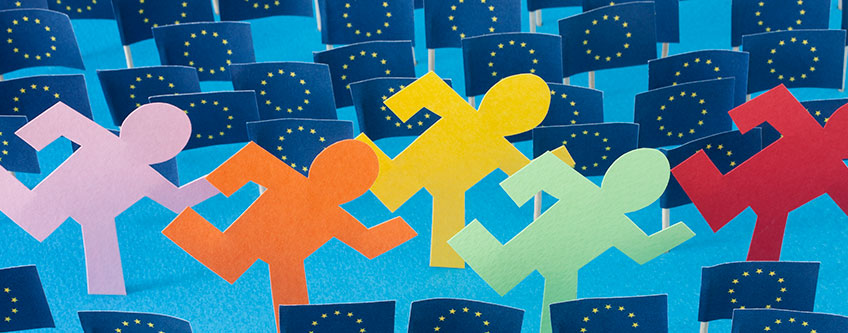European Works Council

The European Works Council (EWC) is the representative body for Generali Group employees in Europe and currently consists of 43 delegates representing 20 countries of the European Economic Area (EEA). It was established in 1997 by the Agreement 11th November 1997 in accordance with the 1994 EU Directive and then renewed along the years in line with the recast EU Directive 2009/38/EC and the Italian decree (decreto legislativo 2012/113).
European Works Council main purpose is to be informed and consulted on European transnational projects/initiatives/measures of the Group which have relevant interest for workers. In 27 years of Generali EWC, we have also issued the European Social Charter in 2006 and conducted with EWC several information and consultation processes on transnational measures implemented by the Group in the European perimeter, as well as joint declarations on relevant topics such as Telework, Diversity, Equity & Inclusion and Emergency crisis (Covid-19 pandemic).
Digital transformation, Artificial Intelligence (AI), well-being and hybrid way of working are also very relevant topics in the EWC current agenda, which in fact are also part of the recent Joint Declaration on the New Sustainable Way of Working in a Next Normal Scenario defined with the EWC in 2023.
The purpose of this Joint Declaration is, among others, to promote sustainable ways of working, based on trust and empowerment as well as work-life balance and enhanced group performance.
The current EWC agreement governs the role, and functioning of the EWC, the annual meetings and the information and consultation of the delegates on issues and projects of transnational relevance which concern workers.
To facilitate dialogue with the parent company during the annual meetings, the EWC has appointed the Select Committee, consisting of eight representatives elected every four years from the EWC delegates, to act as its spokesperson of the whole plenary body consisting of 43 representatives. Among these 8 representatives, the Secretary and the Deputy Secretary are appointed.
To ensure a continuous dialogue between the Secretary, Deputy Secretary, EWC select committee and the Group, a specific function called EWC relations & Labour Network was set up at the Group Head Office.
Member Countries of the Select Committee (SC)
Italy, France, Austria, Spain, Czech Republic, Germany, Other Countries and Central and Eastern European Countries
Belgium, Greece, Ireland, Luxembourg, Portugal.
Bulgaria, Poland, Romania, Slovakia, Slovenia, Hungary, and Croatia.
Dialogue initiatives
Each year, the SC has three regular meetings and the EWC meets twice in plenary session (of which one is dedicated to training for delegates). The Group Chief People and Organization Officer and the EWC Relation & Labour Network always attend to the regular meetings, and Group Top Management attends the mid-year plenary meeting. Besides the regular meetings, during the year additional meetings can also take place even in hybrid mode or in full remote mode, as well as meetings of ad hoc EWC working groups set-up to analyse specific topics (e.g. digital and technological transformation topics).
There are approximately 10 meetings (split into on-site, hybrid and remote) between EWC and Group management, held over a total of approximately 20 days.
The Parent Company sets the agenda of the meetings in agreement with the Secretary of the EWC, who may also propose other topics for discussion during the meetings. Part of the agenda always includes updates on some specific issues, such as those related to human resources, of particular interest to the EWC.
The Group also shares strategic issues with the EWC such as new types of work organisation due to the technological and digital transformation in progress.
In this regard, the following Joint Declarations were signed:
- Telework in May 2017
- Diversity and Inclusion in June 2019
- Emergency crisis caused by the Covid-19 pandemic in May 2021
- New Sustainable Way of Working in a Next Normal Scenario in February 2023
- Diversity, Equity and Inclusion in November 2023
- Technological Transformation, Digitalisation and Artificial Intelligence (AI) in December 2025.
In exceptional circumstances regarding transnational measures that have a significant impact on the interests of workers in at least two countries, extraordinary meetings are called to inform and consult with the SC and the delegates of the relevant countries.
In these cases, the parent company and the Select Committee may open a confrontation process during which information are shared by the management and the EWC may release a non-binding opinion.
Training
During the Plenary session dedicated to training for the EWC delegates, which normally takes place in November specific topics related to the exercise of their representative functions (e.g. collective bargaining and Trade Unions in the EU) as well as social and economic topics and trends of workers’ interest (e.g. digital and technological transformation, AI, Next Normal, Work-life balance etc.) are addressed.
This approach allows delegates to consolidate their shared pool of knowledge to effectively address transnational issues.
Download
-
European Works Council Agreement
543 kb -
Joint Declaration on Telework
259 kb -
Joint Declaration on Diversity & Inclusion (2019)
95 kb -
Joint Declaration on the Emergency Crisis
367 kb -
Joint Declaration on the New Sustainable Way of Working in a Next Normal Scenario
133 kb -
Joint Declaration on Diversity, Equity & Inclusion (2023)
113 kb -
Joint Declaration on Technological Transformation, Digitalisation and Artificial Intelligence (AI)
2 mb
